The Best 10 Alternatives to F5 BIG-IP DNS (+ Pricing & Reviews)
Twingate Team
•
Jul 27, 2024

F5 BIG-IP DNS hyperscales and secures DNS infrastructure, ensuring high availability and performance during high query volumes and DDoS attacks. It offers unmatched DNS performance, on-demand scaling, and enhanced security features. However, it might not be the choice for everyone due to its complexity. This article explores the benefits and limitations of F5 BIG-IP DNS.
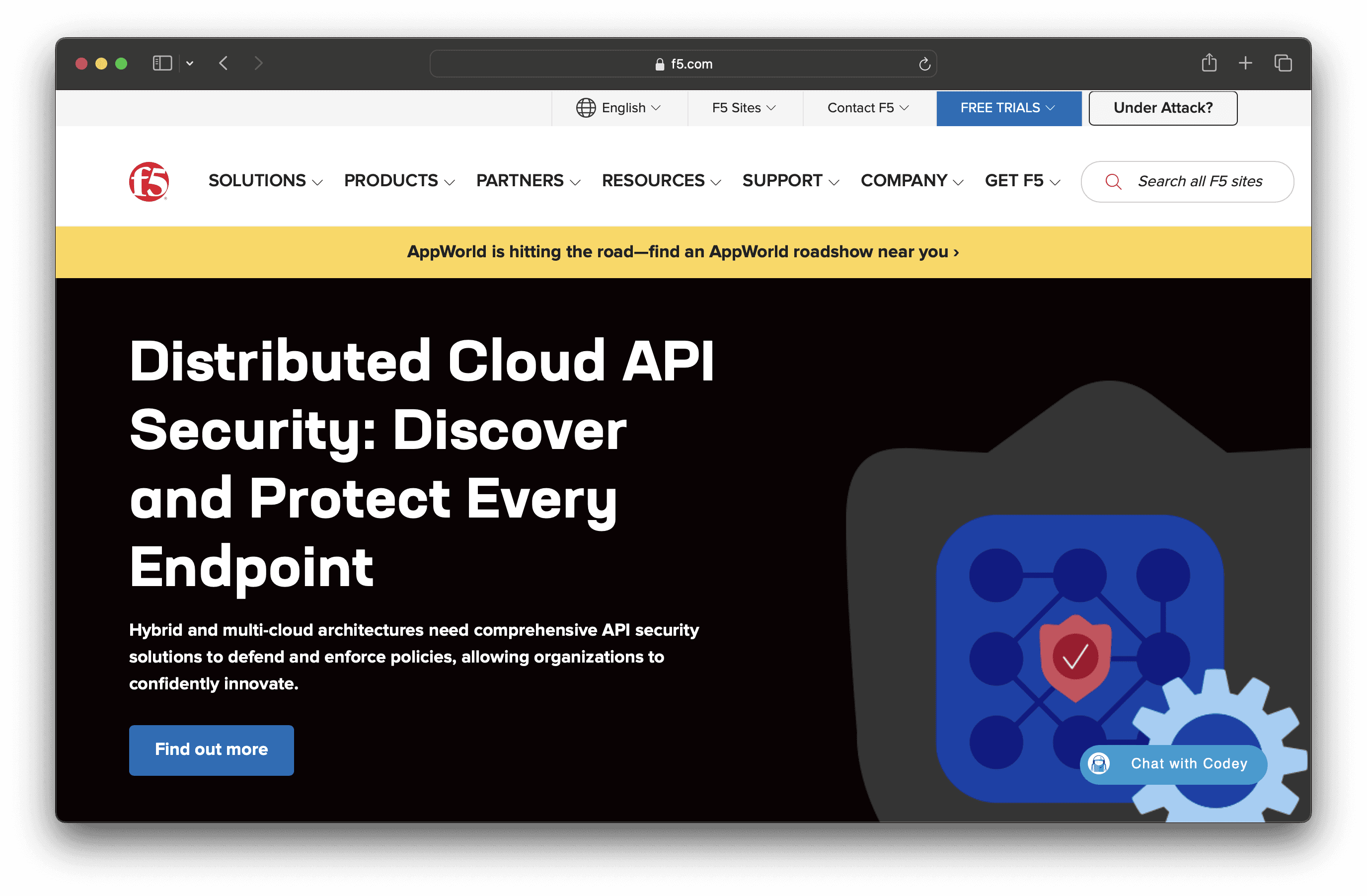
10 Alternatives to F5 BIG-IP DNS
1. Twingate
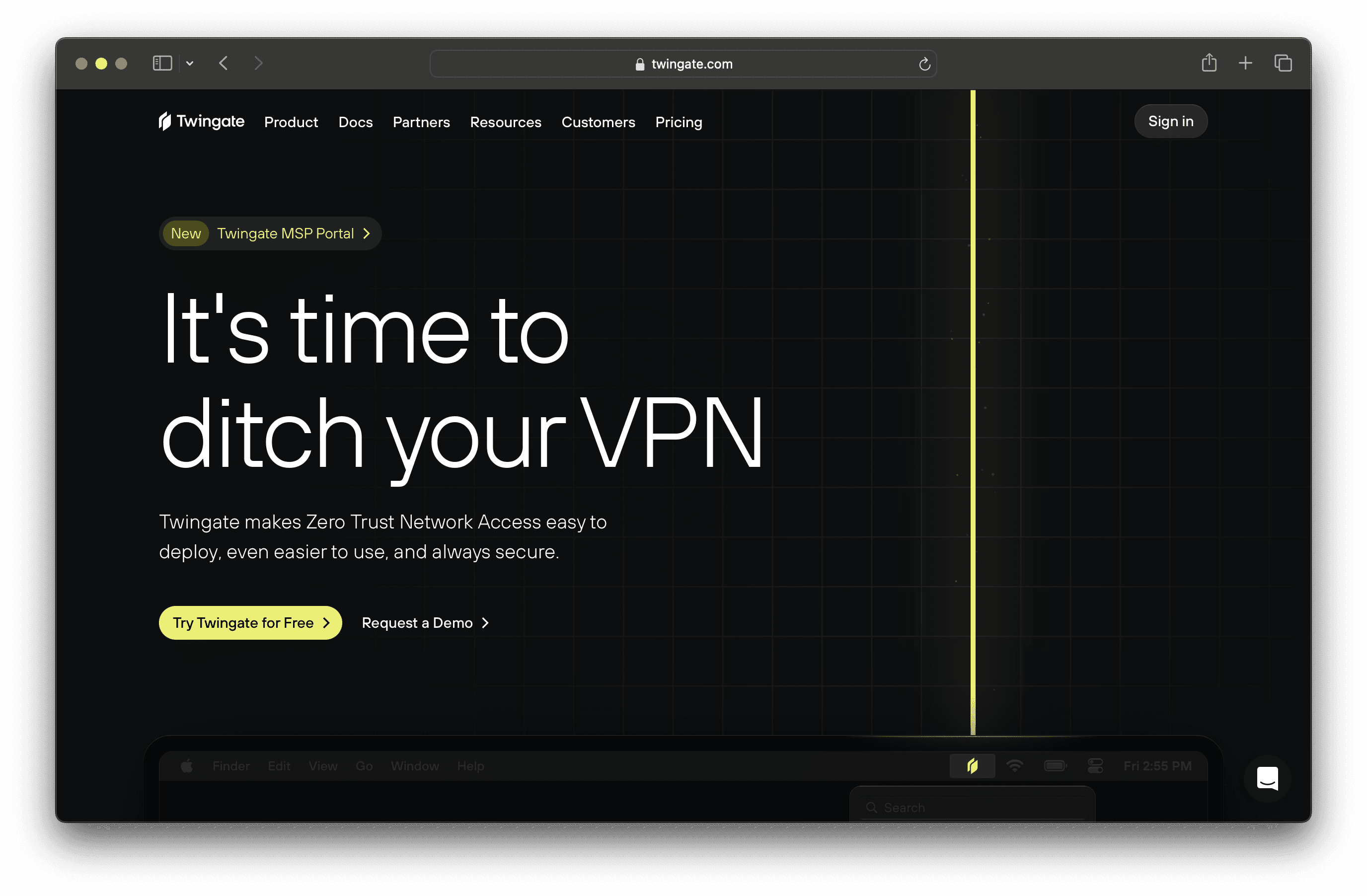
Twingate is a network security solution designed to replace traditional VPNs for remote access, offering a zero-trust security model and seamless deployment alongside existing infrastructure. With a focus on ease of use and scalability, Twingate aims to provide a secure and maintainable solution for businesses of all sizes.
Twingate Pricing
Starter: Free per user/month
Teams: $6 per user/month (monthly), $5 per user/month (yearly)
Business: $12 per user/month (monthly), $10 per user/month (yearly)
Enterprise: Custom pricing per user/month
Twingate Reviews
Twingate has an overall rating of 4.7 out of 5 stars based on 63 reviews. Users praise its ease of setup and high security. Check out more of our reviews here!
Pros and Cons of Twingate
Pros:
Users find Twingate extremely easy to use, making it accessible even for those not well-versed in data security software.
The setup process is straightforward and quick, allowing businesses to deploy it without extensive technical knowledge.
Customer support is highly rated, providing timely and effective assistance to resolve any issues that arise.
Cons:
Some users have reported occasional performance issues, which can affect the reliability of the service.
There are limited customization options, which may not meet the specific needs of all organizations.
Logging issues have been noted, making it difficult to track and audit user activities comprehensively.
2. Sophos
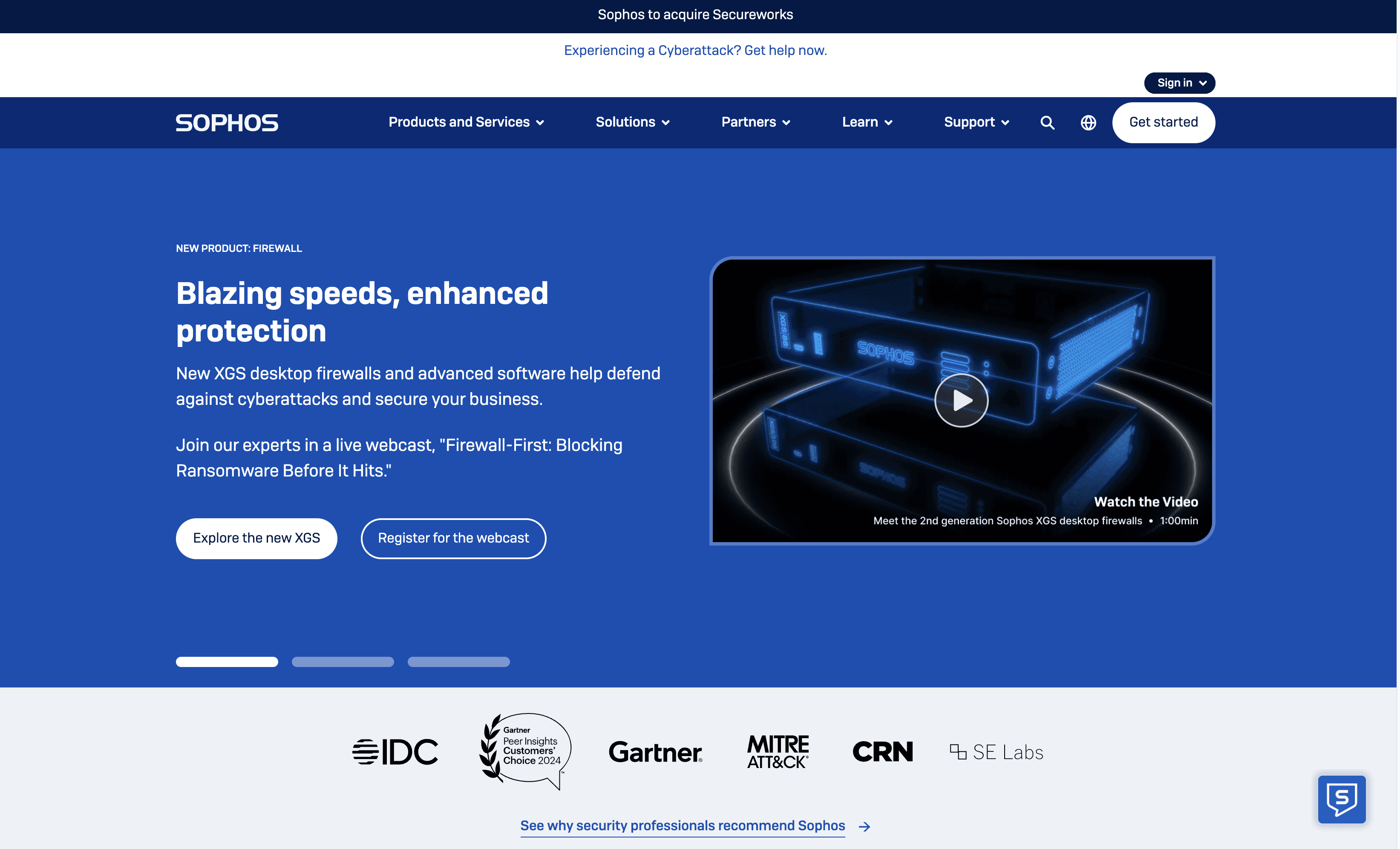
Sophos is a cybersecurity management platform that offers comprehensive protection for endpoints, email, mobile, and servers. It provides a centralized interface for managing all security products, ensuring ease of use and robust security for businesses of all sizes.
Sophos Pricing
Sophos's pricing is not public. Contact their support for more info.
Sophos Reviews
Sophos has an overall rating of 4.6 out of 5 stars based on 334 reviews. Users appreciate its ease of use and robust security features. Check out more of our reviews here!
Pros and Cons ofSophos
Pros:
Comprehensive protection across endpoints, email, mobile, and servers, ensuring robust security for diverse business needs.
Centralized management interface simplifies the administration of all security products, enhancing operational efficiency.
Highly rated for ease of use, making it accessible even for those not well-versed in cybersecurity.
Cons:
Some users report poor reporting capabilities, which can hinder effective monitoring and analysis.
Customer support has been criticized for being slow and unresponsive, affecting issue resolution times.
High cost may be prohibitive for smaller businesses or those with limited budgets.
3. SafeDNS
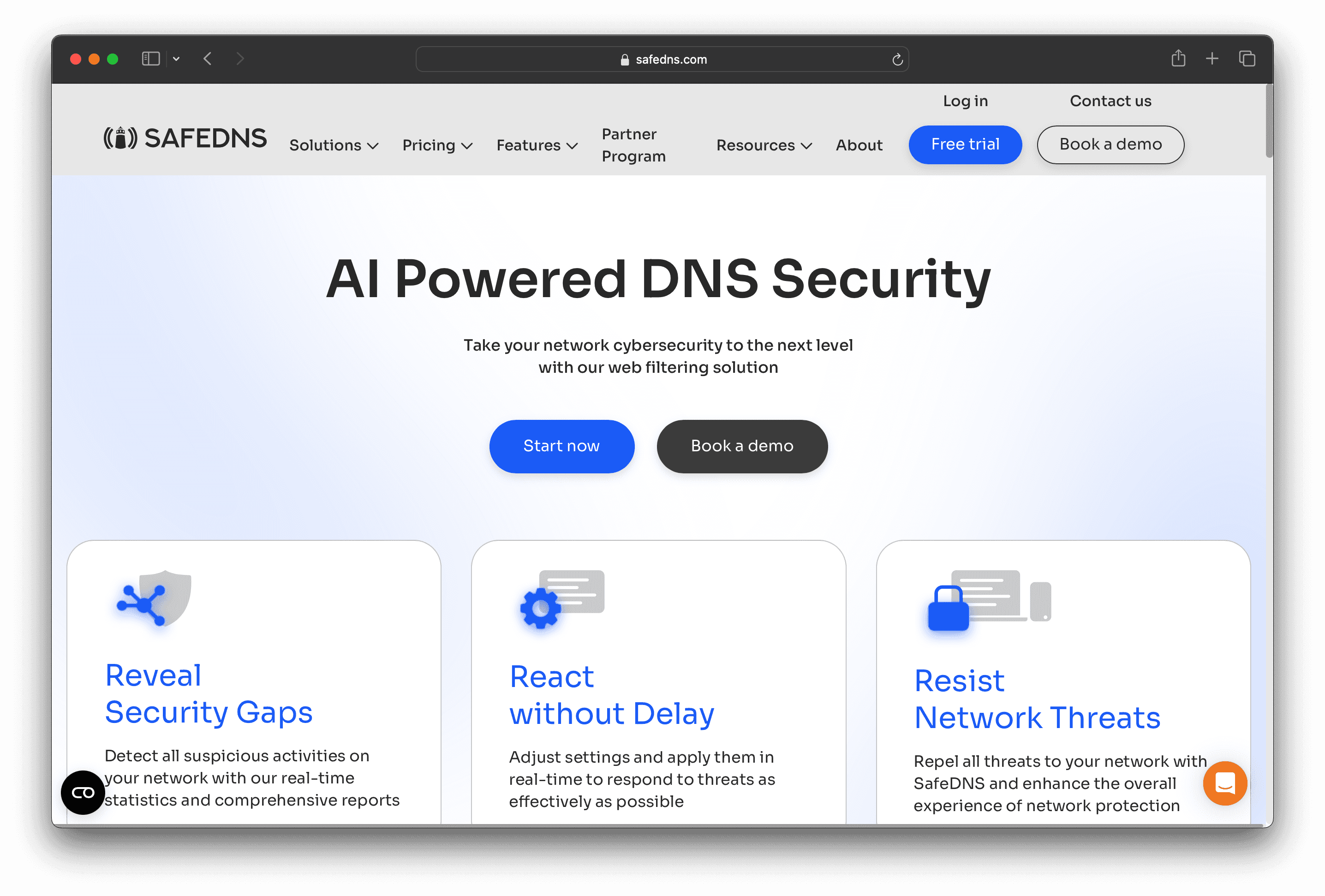
SafeDNS is a cloud-based DNS filtering solution designed to enhance network security by blocking malicious websites and filtering inappropriate content. With AI-powered technology, it aims to protect businesses and organizations from cyber threats, offering easy deployment and user-friendly management for all levels of technical expertise.
SafeDNS Pricing
Safe Home: $25.95 per year, $39.95 for 2 years
Safe Family: $35.95 per year, $55.95 for 2 years
SafeDNS Reviews
SafeDNS has an overall rating of 4.7 out of 5 stars based on 15 reviews. Users find the system simple and effective for content filtering. Check out more of our reviews here!
Pros and Cons of SafeDNS
Pros:
Effective Content Filtering: AI-driven technology filters inappropriate content across 66 categories, ensuring robust protection.
Quick Support: Users appreciate the fast and helpful customer support, available 24/7.
User-Friendly: The platform is easy to set up and navigate, even for those without an IT background.
Cons:
Whitelist Management: Some users find managing whitelists challenging, requiring manual adjustments.
Interface Speed: The interface can occasionally be slow, affecting user experience.
Lack of iOS Agent: Users wish for an iOS agent to enhance mobile device management.
4. Avast Secure Web Gateway
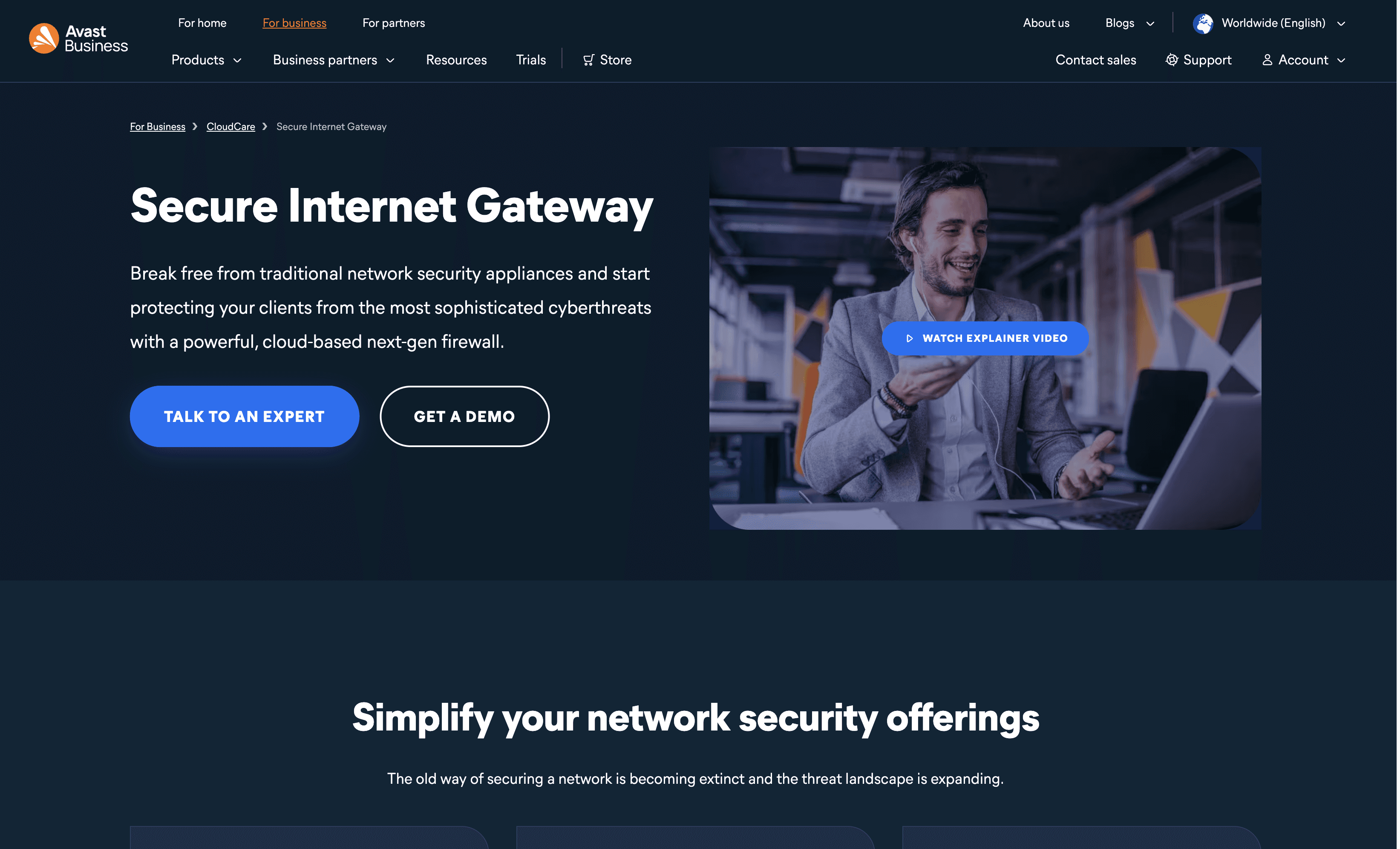
Avast Secure Web Gateway is a cloud-based firewall designed to protect businesses from advanced cyber threats. It offers features like SSL/TLS inspection, content filtering, and mobile protection. With easy deployment and centralized management, it aims to provide robust security without the need for complex hardware.
Avast Secure Web Gateway Pricing
Avast Secure Web Gateway's pricing is not public. Contact their support for more info.
Avast Secure Web Gateway Reviews
Avast Secure Web Gateway has an overall rating of 5.0 out of 5 stars based on 2 reviews. Users praise its comprehensive protection and ease of use. Check out more of our reviews here!
Pros and Cons of Avast Secure Web Gateway
Pros:
Exceptional Security: Blocks phishing and malware threats, providing an additional layer of security.
Real-time URL Scanning: Offers peace of mind when clicking on unknown links.
Intuitive Interface: User-friendly and easy to navigate, making it accessible for all users.
Cons:
False Positives: Occasionally flags legitimate websites or content as malicious, causing inconvenience.
Performance Issues: Some users experience slowdowns after the system blocks a threat.
Complexity for Small Businesses: Extensive features might be overwhelming for smaller businesses without dedicated IT staff.
5. Loopia DNS
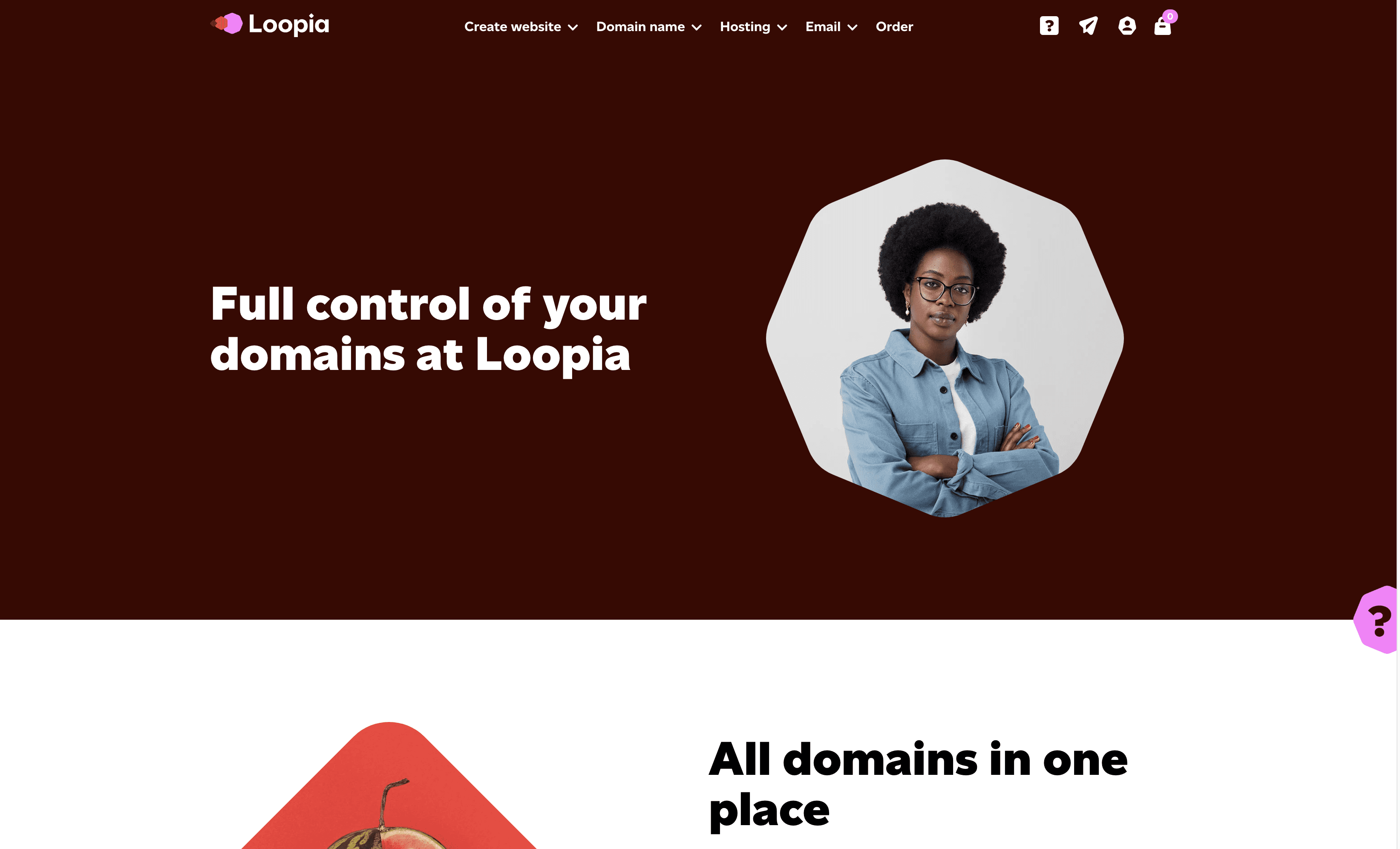
LoopiaDNS is a domain management service that offers advanced DNS configuration, dynamic DNS, and email forwarding. Designed for ease of use, it provides a centralized control panel for managing all your domain names, making it a practical solution for businesses and individuals alike.
Loopia DNS Pricing
LoopiaDomain: 0 SEK (Free)
LoopiaDNS: 9 SEK/month excluding VAT, 11.25 SEK/month including VAT
Loopia DNS Reviews
LoopiaDNS has an overall rating of 4.1 out of 5 stars based on 12 reviews. Users appreciate its ease of use and reliability. Check out more of our reviews here!
Pros and Cons of Loopia DNS
Pros:
Unlimited Domains: Manage an unlimited number of domain names and subdomains, providing extensive flexibility for users.
Dynamic DNS: Supports dynamic DNS updates, ideal for servers with changing IP addresses, ensuring seamless connectivity.
Advanced Configuration: Offers advanced DNS settings like CNAME, A, and MX records, catering to complex domain management needs.
Cons:
Cost: The service is not free, costing 9 SEK/month excluding VAT, which may be a barrier for some users.
Limited Newsletter Capacity: The email newsletter feature is restricted to 125 contacts and 625 emails per month, limiting outreach.
Technical Support: Users report slow and unresponsive technical support, which can delay issue resolution.
6. Google Cloud DNS
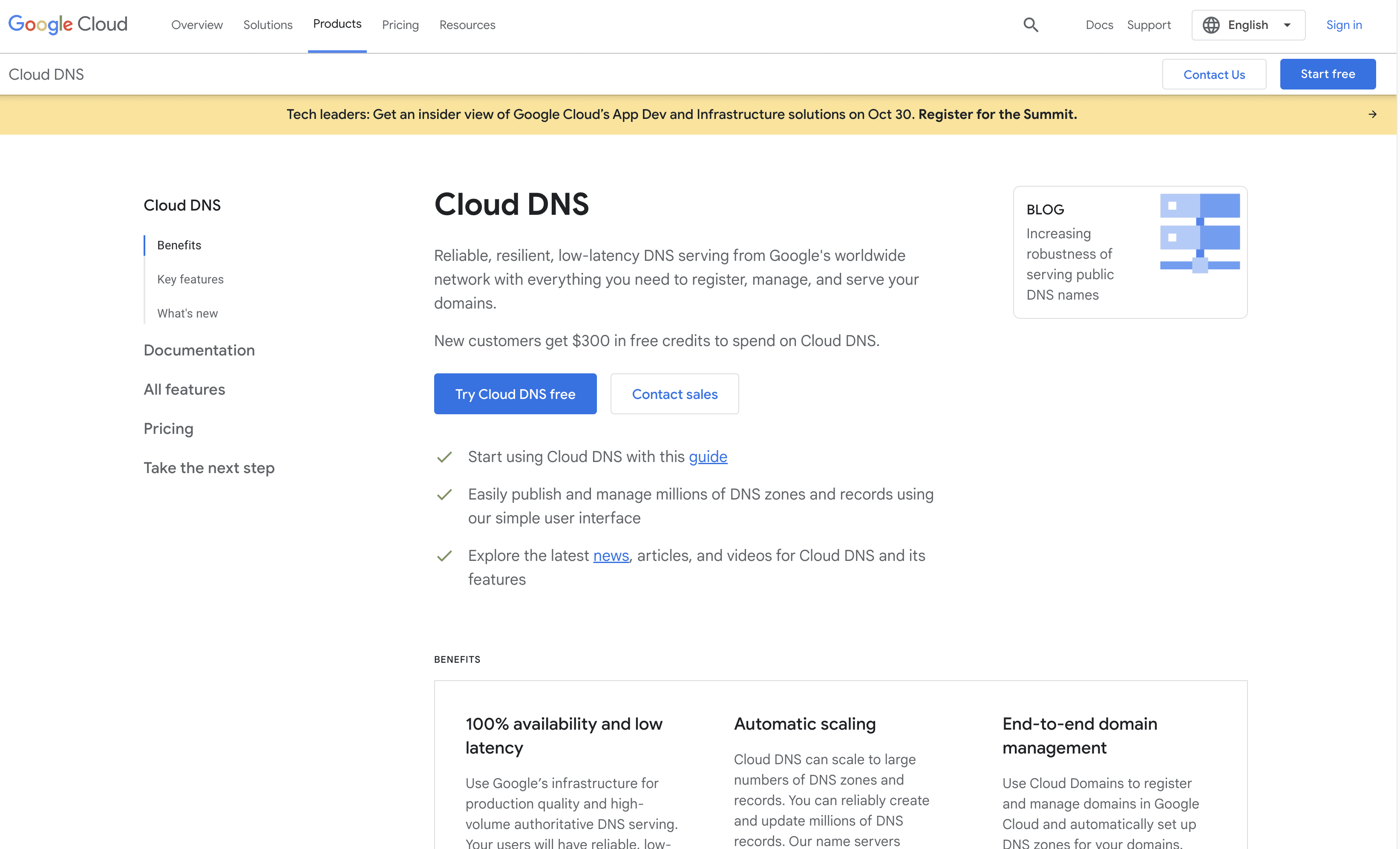
Google Cloud DNS is a scalable, reliable, and low-latency DNS service powered by Google's global network. It simplifies domain management with features like automatic scaling and integration with other Google Cloud services, making it an ideal choice for businesses seeking efficient and secure DNS solutions.
Google Cloud DNS Pricing
Google Cloud DNS's pricing is not public. Contact their support for more info.
Google Cloud DNS Reviews
Google Cloud DNS has an overall rating of 4.6 out of 5 stars based on 37 reviews. Users praise its reliability and ease of use. Check out more of our reviews here!
Pros and Cons of Google Cloud DNS
Pros:
Google Cloud DNS offers 100% availability and low latency, ensuring reliable and fast access to your domain names worldwide.
Automatic scaling handles large numbers of DNS zones and records, adapting seamlessly to query volumes.
End-to-end domain management integrates with Cloud Domains, simplifying the process of registering and managing domains.
Cons:
Some users find the interface complex, which can be challenging for those not familiar with DNS management.
Occasional DNS functionality issues have been reported, affecting the reliability of the service.
Higher costs compared to some competitors may be prohibitive for smaller businesses or those with limited budgets.
7. Azure DNS
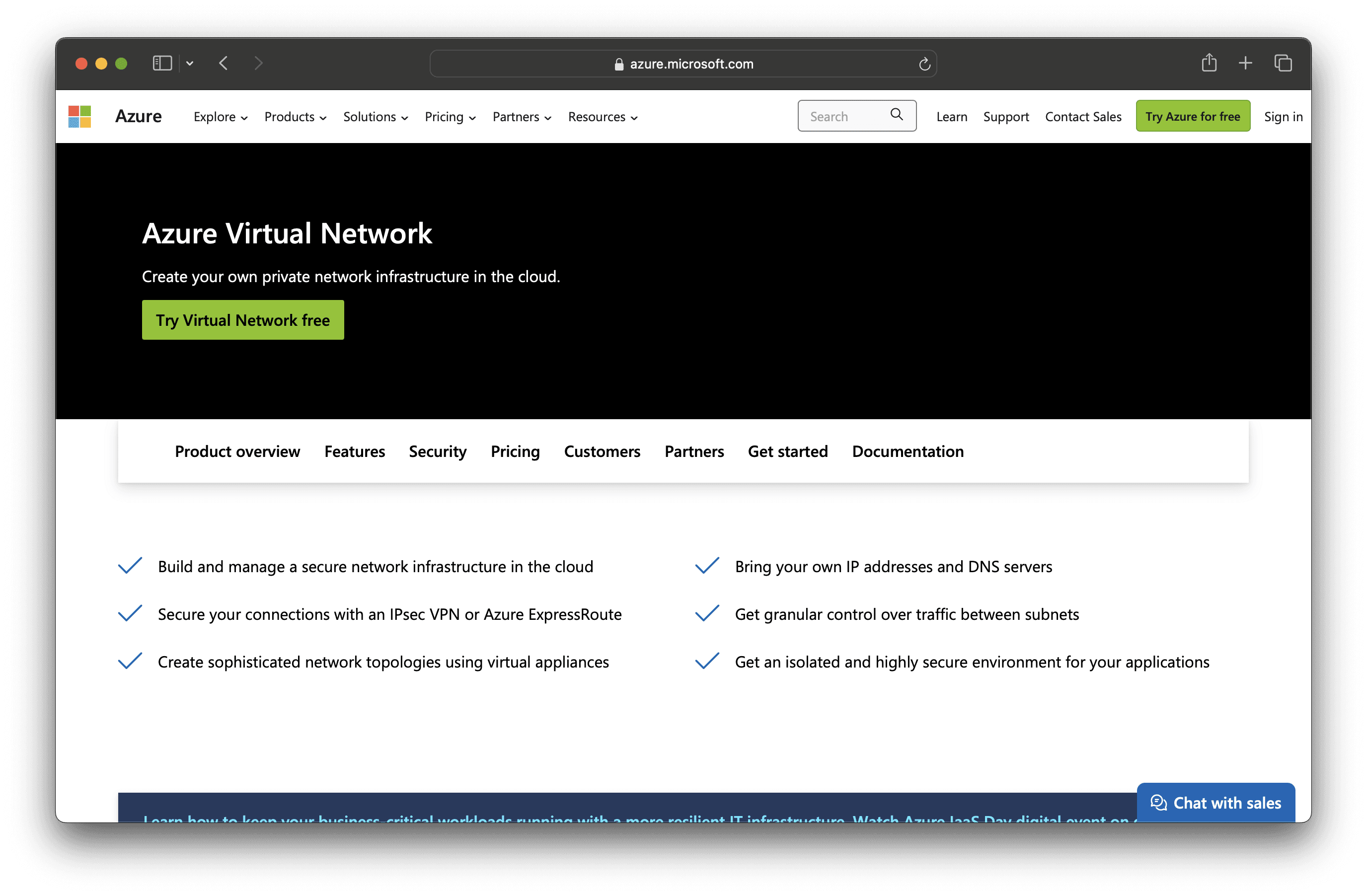
Azure DNS is a cloud-based service that hosts DNS domains, providing high availability and fast DNS queries. Integrated with other Azure services, it simplifies domain management and ensures seamless updates. Ideal for businesses seeking reliable and scalable DNS solutions, Azure DNS offers robust performance and ease of use.
Azure DNS Pricing
Azure Free Account: $0 for 12 months
Pay-as-you-go: Pay only for what you use
Post 12 Months: Pay only for what you use
Azure DNS Reviews
Azure DNS has an overall rating of 4.4 out of 5 stars based on 23 reviews. Users praise its reliability and integration with other Azure services. Check out more of our reviews here!
Pros and Cons of Azure DNS
Pros:
DNS-hosted alongside your apps: Manage DNS records using the same credentials, billing, and support contract as other Azure services.
Ultra-high availability: Benefit from the scale and redundancy of Microsoft's global network of name servers.
Fast DNS queries: Utilize a global network of name servers for faster responses to DNS queries.
Cons:
Complex User Interface: Some users find the interface complicated and difficult to navigate.
Expensive: The service is considered expensive by some users, especially for small businesses.
Limited Features: There are complaints about the limited features compared to other DNS services.
8. Gcore DNS
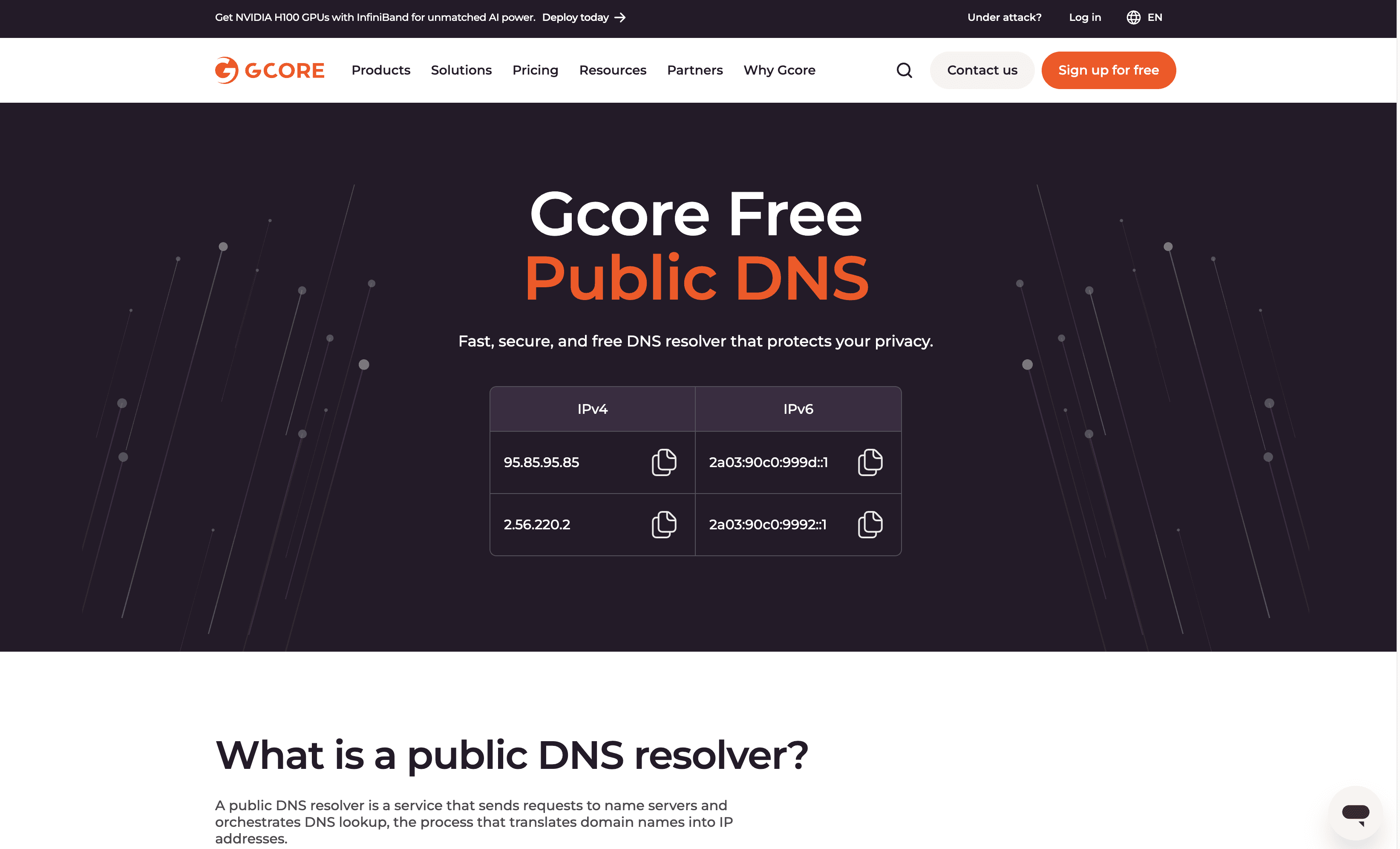
Gcore DNS is a fast, secure, and free DNS resolver designed to protect your privacy. It offers high-speed performance, robust security features, and resilience against DDoS attacks, making it an ideal choice for users seeking reliable and efficient DNS services.
Gcore DNS Pricing
CPU Optimized Instances (Gen 1)
GPU Instances (Gen 1)
High-Frequency Instances (Gen 1)
Memory Optimized Instances (Gen 1)
SGX-enabled Instances (Gen 1)
Standard Instances (Gen 1)
Managed Kubernetes
Private Networks
Functions
Inference at the Edge
Gcore DNS's pricing is not public. Contact their support for more info.
Gcore DNS Reviews
Gcore DNS has an overall rating of 4.3 out of 5 stars based on 13 reviews. Users appreciate the fast loading times and global network. Check out more of our reviews here!
Pros and Cons of Gcore DNS
Pros:
High-Speed Performance: Gcore DNS is one of the fastest DNS resolvers in Europe, South America, and Africa, ensuring quick query responses.
Global Edge Network: Operates over a global edge network with 180+ points of presence (PoPs) worldwide, enhancing reliability and speed.
Strong Privacy Measures: Anonymizes DNS query logs and stores them securely under EU law, ensuring user privacy.
Cons:
Not the Fastest: While fast, Gcore DNS is not the fastest compared to some competitors like 1.1.1.1.
Limited Support Information: The service page lacks detailed information on customer support, which may concern some users.
Feature Limitations: Some users report that not all features are available, especially in the free trial version.
9. DNS Filter
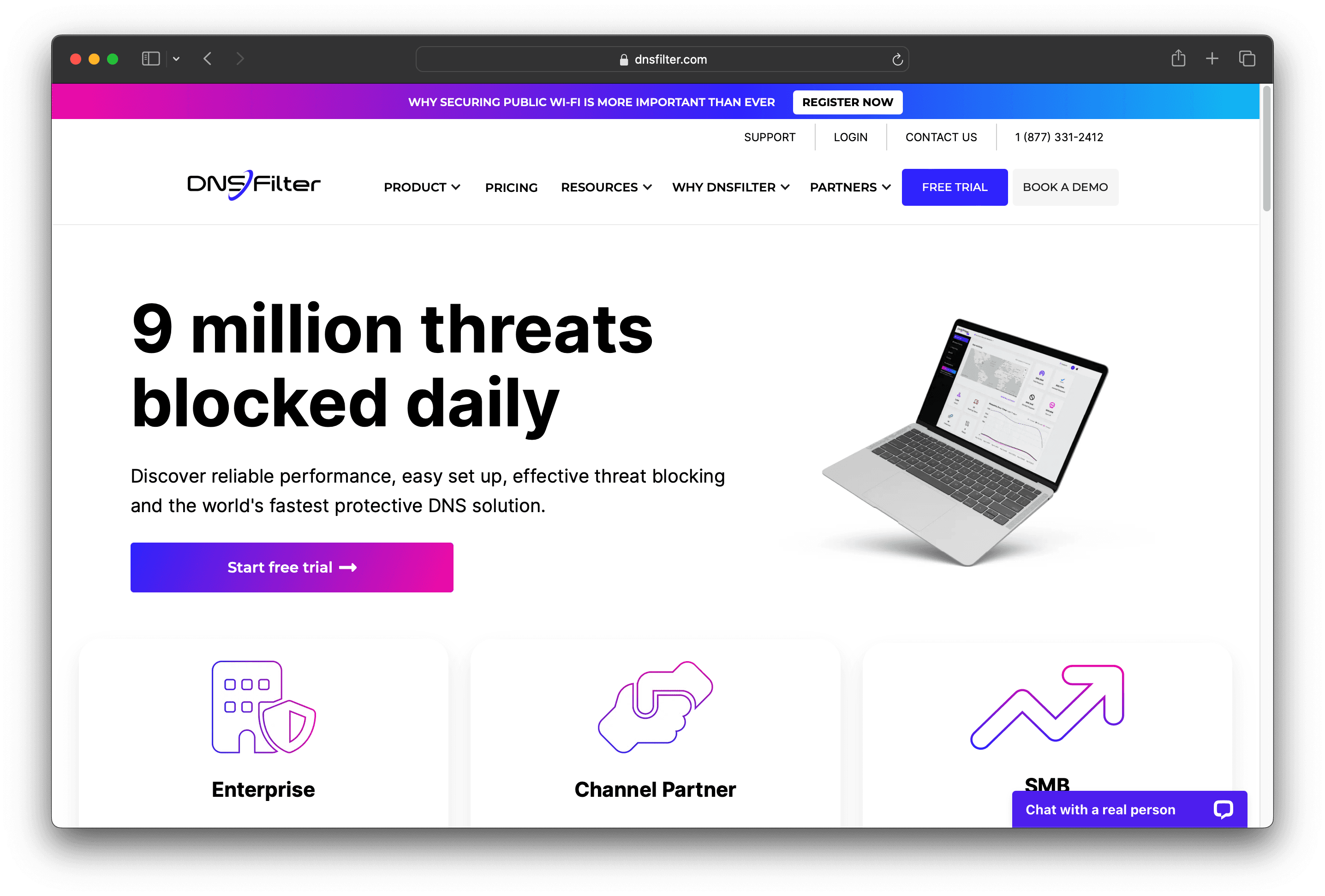
DNSFilter is a DNS filtering and security solution designed to block threats and filter content. It offers easy setup, intuitive reporting, and remote protection, making it ideal for businesses of all sizes. With machine learning for threat detection and a user-friendly interface, DNSFilter ensures robust and reliable security.
DNS Filter Pricing
Basic Plan: $0.90 per user per month
Pro Plan: $1.80 per user per month
Enterprise Plan: $2.70 per user per month
MSP Pricing: Starts at $150 per month
Public Wi-Fi Pricing: Starts at $0.25 per user per month or $1.25 per access point per month
Education Pricing: Starts at $4 per year for each student and staff member (minimum of 125 users)
DNS Filter Reviews
DNSFilter has an overall rating of 4.6 out of 5 stars based on 237 reviews. Users praise its ease of deployment and effective threat protection. Check out more of our reviews here!
Pros and Cons of DNS Filter
Pros:
Easy Setup and Deployment: Customers find it incredibly easy to get started and deploy DNSFilter.
User-Friendly Interface: The interface is intuitive and user-friendly, making ongoing administration simple.
Effective Threat Blocking: DNSFilter effectively blocks threats at the DNS level, providing an additional layer of security.
Cons:
Lack of DNS-over-HTTPS (DoH) Support: Several users mention the lack of DoH support as a significant drawback.
Issues with VPN Compatibility: Some users have experienced challenges when using DNSFilter with VPNs.
Occasional Misclassification: There are instances where sites are miscategorized, though this is expected to some extent.
10. Cisco Umbrella
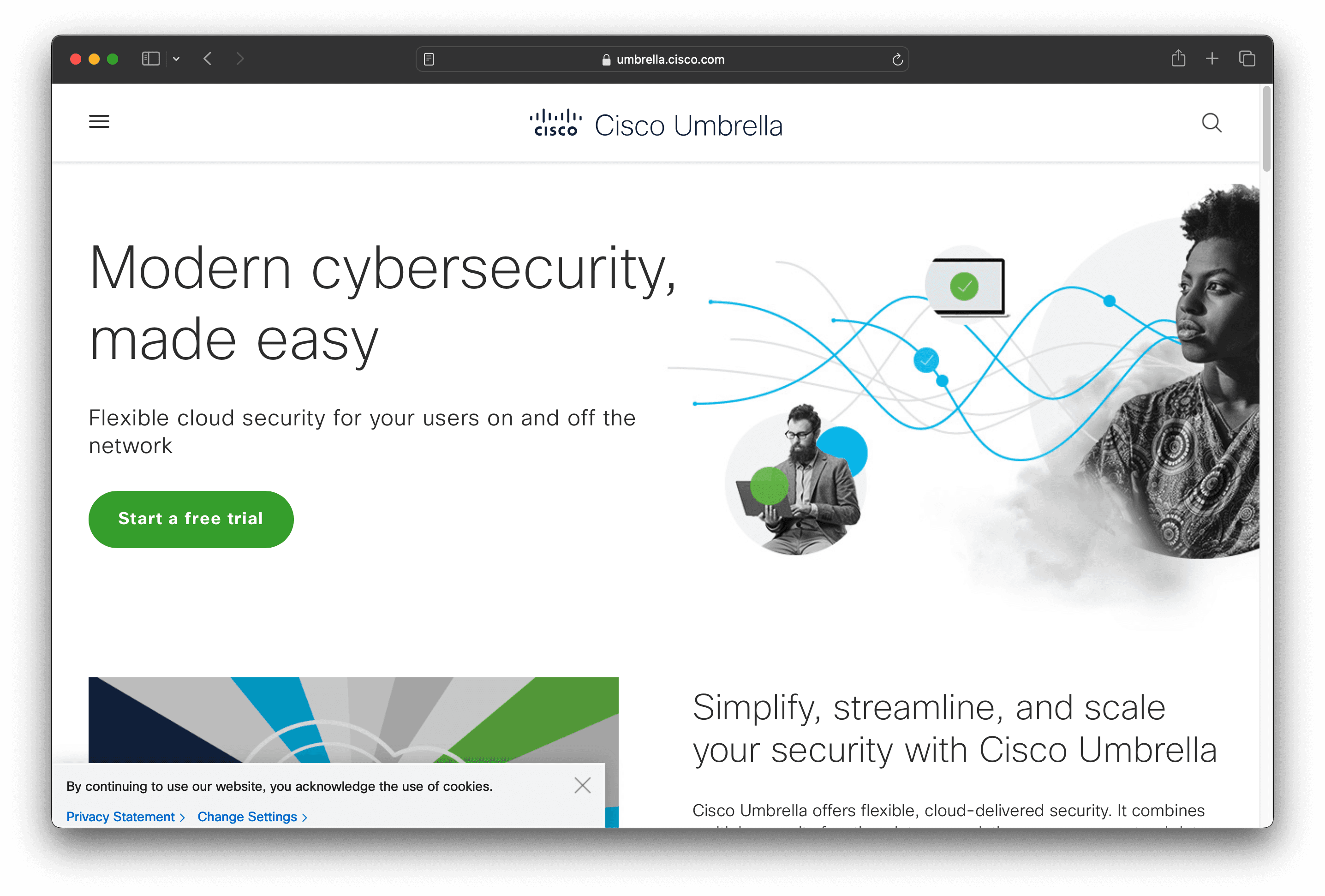
Cisco Umbrella is a cloud cybersecurity solution offering DNS-layer security, secure web gateway, and cloud access security broker. Designed for easy deployment and management, it provides robust protection against cyber threats, making it ideal for businesses seeking reliable and scalable security solutions.
Cisco Umbrella Pricing
DNS Security Essentials Package
DNS Security Advantage Package
SIG Essentials Package
SIG Advantage Package
Umbrella Support Packages
Cisco Umbrella for Government Packages
Cisco Umbrella's pricing is not public. Contact their support for more info.
Cisco Umbrella Reviews
Cisco Umbrella has an overall rating of 4.4 out of 5 stars based on 271 reviews. Users appreciate its ease of use and robust security. Check out more of our reviews here!
Pros and Cons of Cisco Umbrella
Pros:
Comprehensive Security: Cisco Umbrella offers multi-layered protection, including DNS-layer security, secure web gateway, and cloud access security broker.
Ease of Use: Users find it easy to configure and manage, making it accessible even for those with limited IT resources.
Integration: Seamlessly integrates with other Cisco products and over 400 third-party tools, enhancing its versatility.
Cons:
Cost: The advanced features and comprehensive packages can be expensive, posing a barrier for smaller businesses.
Learning Curve: Despite its ease of deployment, fully utilizing all features may require significant training.
Complexity for Small Businesses: The extensive range of features might be overwhelming for smaller organizations with limited IT staff.
Looking to secure your technical infrastructure?
Twingate offers granular access controls and deployment automations to protect your VPC environment. By leveraging Zero Trust security tools, Twingate ensures that private resources and internet traffic remain secure in the modern world of work. Try Twingate for Free today!
Rapidly implement a modern Zero Trust network that is more secure and maintainable than VPNs.
The Best 10 Alternatives to F5 BIG-IP DNS (+ Pricing & Reviews)
Twingate Team
•
Jul 27, 2024

F5 BIG-IP DNS hyperscales and secures DNS infrastructure, ensuring high availability and performance during high query volumes and DDoS attacks. It offers unmatched DNS performance, on-demand scaling, and enhanced security features. However, it might not be the choice for everyone due to its complexity. This article explores the benefits and limitations of F5 BIG-IP DNS.

10 Alternatives to F5 BIG-IP DNS
1. Twingate

Twingate is a network security solution designed to replace traditional VPNs for remote access, offering a zero-trust security model and seamless deployment alongside existing infrastructure. With a focus on ease of use and scalability, Twingate aims to provide a secure and maintainable solution for businesses of all sizes.
Twingate Pricing
Starter: Free per user/month
Teams: $6 per user/month (monthly), $5 per user/month (yearly)
Business: $12 per user/month (monthly), $10 per user/month (yearly)
Enterprise: Custom pricing per user/month
Twingate Reviews
Twingate has an overall rating of 4.7 out of 5 stars based on 63 reviews. Users praise its ease of setup and high security. Check out more of our reviews here!
Pros and Cons of Twingate
Pros:
Users find Twingate extremely easy to use, making it accessible even for those not well-versed in data security software.
The setup process is straightforward and quick, allowing businesses to deploy it without extensive technical knowledge.
Customer support is highly rated, providing timely and effective assistance to resolve any issues that arise.
Cons:
Some users have reported occasional performance issues, which can affect the reliability of the service.
There are limited customization options, which may not meet the specific needs of all organizations.
Logging issues have been noted, making it difficult to track and audit user activities comprehensively.
2. Sophos

Sophos is a cybersecurity management platform that offers comprehensive protection for endpoints, email, mobile, and servers. It provides a centralized interface for managing all security products, ensuring ease of use and robust security for businesses of all sizes.
Sophos Pricing
Sophos's pricing is not public. Contact their support for more info.
Sophos Reviews
Sophos has an overall rating of 4.6 out of 5 stars based on 334 reviews. Users appreciate its ease of use and robust security features. Check out more of our reviews here!
Pros and Cons ofSophos
Pros:
Comprehensive protection across endpoints, email, mobile, and servers, ensuring robust security for diverse business needs.
Centralized management interface simplifies the administration of all security products, enhancing operational efficiency.
Highly rated for ease of use, making it accessible even for those not well-versed in cybersecurity.
Cons:
Some users report poor reporting capabilities, which can hinder effective monitoring and analysis.
Customer support has been criticized for being slow and unresponsive, affecting issue resolution times.
High cost may be prohibitive for smaller businesses or those with limited budgets.
3. SafeDNS

SafeDNS is a cloud-based DNS filtering solution designed to enhance network security by blocking malicious websites and filtering inappropriate content. With AI-powered technology, it aims to protect businesses and organizations from cyber threats, offering easy deployment and user-friendly management for all levels of technical expertise.
SafeDNS Pricing
Safe Home: $25.95 per year, $39.95 for 2 years
Safe Family: $35.95 per year, $55.95 for 2 years
SafeDNS Reviews
SafeDNS has an overall rating of 4.7 out of 5 stars based on 15 reviews. Users find the system simple and effective for content filtering. Check out more of our reviews here!
Pros and Cons of SafeDNS
Pros:
Effective Content Filtering: AI-driven technology filters inappropriate content across 66 categories, ensuring robust protection.
Quick Support: Users appreciate the fast and helpful customer support, available 24/7.
User-Friendly: The platform is easy to set up and navigate, even for those without an IT background.
Cons:
Whitelist Management: Some users find managing whitelists challenging, requiring manual adjustments.
Interface Speed: The interface can occasionally be slow, affecting user experience.
Lack of iOS Agent: Users wish for an iOS agent to enhance mobile device management.
4. Avast Secure Web Gateway

Avast Secure Web Gateway is a cloud-based firewall designed to protect businesses from advanced cyber threats. It offers features like SSL/TLS inspection, content filtering, and mobile protection. With easy deployment and centralized management, it aims to provide robust security without the need for complex hardware.
Avast Secure Web Gateway Pricing
Avast Secure Web Gateway's pricing is not public. Contact their support for more info.
Avast Secure Web Gateway Reviews
Avast Secure Web Gateway has an overall rating of 5.0 out of 5 stars based on 2 reviews. Users praise its comprehensive protection and ease of use. Check out more of our reviews here!
Pros and Cons of Avast Secure Web Gateway
Pros:
Exceptional Security: Blocks phishing and malware threats, providing an additional layer of security.
Real-time URL Scanning: Offers peace of mind when clicking on unknown links.
Intuitive Interface: User-friendly and easy to navigate, making it accessible for all users.
Cons:
False Positives: Occasionally flags legitimate websites or content as malicious, causing inconvenience.
Performance Issues: Some users experience slowdowns after the system blocks a threat.
Complexity for Small Businesses: Extensive features might be overwhelming for smaller businesses without dedicated IT staff.
5. Loopia DNS

LoopiaDNS is a domain management service that offers advanced DNS configuration, dynamic DNS, and email forwarding. Designed for ease of use, it provides a centralized control panel for managing all your domain names, making it a practical solution for businesses and individuals alike.
Loopia DNS Pricing
LoopiaDomain: 0 SEK (Free)
LoopiaDNS: 9 SEK/month excluding VAT, 11.25 SEK/month including VAT
Loopia DNS Reviews
LoopiaDNS has an overall rating of 4.1 out of 5 stars based on 12 reviews. Users appreciate its ease of use and reliability. Check out more of our reviews here!
Pros and Cons of Loopia DNS
Pros:
Unlimited Domains: Manage an unlimited number of domain names and subdomains, providing extensive flexibility for users.
Dynamic DNS: Supports dynamic DNS updates, ideal for servers with changing IP addresses, ensuring seamless connectivity.
Advanced Configuration: Offers advanced DNS settings like CNAME, A, and MX records, catering to complex domain management needs.
Cons:
Cost: The service is not free, costing 9 SEK/month excluding VAT, which may be a barrier for some users.
Limited Newsletter Capacity: The email newsletter feature is restricted to 125 contacts and 625 emails per month, limiting outreach.
Technical Support: Users report slow and unresponsive technical support, which can delay issue resolution.
6. Google Cloud DNS

Google Cloud DNS is a scalable, reliable, and low-latency DNS service powered by Google's global network. It simplifies domain management with features like automatic scaling and integration with other Google Cloud services, making it an ideal choice for businesses seeking efficient and secure DNS solutions.
Google Cloud DNS Pricing
Google Cloud DNS's pricing is not public. Contact their support for more info.
Google Cloud DNS Reviews
Google Cloud DNS has an overall rating of 4.6 out of 5 stars based on 37 reviews. Users praise its reliability and ease of use. Check out more of our reviews here!
Pros and Cons of Google Cloud DNS
Pros:
Google Cloud DNS offers 100% availability and low latency, ensuring reliable and fast access to your domain names worldwide.
Automatic scaling handles large numbers of DNS zones and records, adapting seamlessly to query volumes.
End-to-end domain management integrates with Cloud Domains, simplifying the process of registering and managing domains.
Cons:
Some users find the interface complex, which can be challenging for those not familiar with DNS management.
Occasional DNS functionality issues have been reported, affecting the reliability of the service.
Higher costs compared to some competitors may be prohibitive for smaller businesses or those with limited budgets.
7. Azure DNS

Azure DNS is a cloud-based service that hosts DNS domains, providing high availability and fast DNS queries. Integrated with other Azure services, it simplifies domain management and ensures seamless updates. Ideal for businesses seeking reliable and scalable DNS solutions, Azure DNS offers robust performance and ease of use.
Azure DNS Pricing
Azure Free Account: $0 for 12 months
Pay-as-you-go: Pay only for what you use
Post 12 Months: Pay only for what you use
Azure DNS Reviews
Azure DNS has an overall rating of 4.4 out of 5 stars based on 23 reviews. Users praise its reliability and integration with other Azure services. Check out more of our reviews here!
Pros and Cons of Azure DNS
Pros:
DNS-hosted alongside your apps: Manage DNS records using the same credentials, billing, and support contract as other Azure services.
Ultra-high availability: Benefit from the scale and redundancy of Microsoft's global network of name servers.
Fast DNS queries: Utilize a global network of name servers for faster responses to DNS queries.
Cons:
Complex User Interface: Some users find the interface complicated and difficult to navigate.
Expensive: The service is considered expensive by some users, especially for small businesses.
Limited Features: There are complaints about the limited features compared to other DNS services.
8. Gcore DNS

Gcore DNS is a fast, secure, and free DNS resolver designed to protect your privacy. It offers high-speed performance, robust security features, and resilience against DDoS attacks, making it an ideal choice for users seeking reliable and efficient DNS services.
Gcore DNS Pricing
CPU Optimized Instances (Gen 1)
GPU Instances (Gen 1)
High-Frequency Instances (Gen 1)
Memory Optimized Instances (Gen 1)
SGX-enabled Instances (Gen 1)
Standard Instances (Gen 1)
Managed Kubernetes
Private Networks
Functions
Inference at the Edge
Gcore DNS's pricing is not public. Contact their support for more info.
Gcore DNS Reviews
Gcore DNS has an overall rating of 4.3 out of 5 stars based on 13 reviews. Users appreciate the fast loading times and global network. Check out more of our reviews here!
Pros and Cons of Gcore DNS
Pros:
High-Speed Performance: Gcore DNS is one of the fastest DNS resolvers in Europe, South America, and Africa, ensuring quick query responses.
Global Edge Network: Operates over a global edge network with 180+ points of presence (PoPs) worldwide, enhancing reliability and speed.
Strong Privacy Measures: Anonymizes DNS query logs and stores them securely under EU law, ensuring user privacy.
Cons:
Not the Fastest: While fast, Gcore DNS is not the fastest compared to some competitors like 1.1.1.1.
Limited Support Information: The service page lacks detailed information on customer support, which may concern some users.
Feature Limitations: Some users report that not all features are available, especially in the free trial version.
9. DNS Filter

DNSFilter is a DNS filtering and security solution designed to block threats and filter content. It offers easy setup, intuitive reporting, and remote protection, making it ideal for businesses of all sizes. With machine learning for threat detection and a user-friendly interface, DNSFilter ensures robust and reliable security.
DNS Filter Pricing
Basic Plan: $0.90 per user per month
Pro Plan: $1.80 per user per month
Enterprise Plan: $2.70 per user per month
MSP Pricing: Starts at $150 per month
Public Wi-Fi Pricing: Starts at $0.25 per user per month or $1.25 per access point per month
Education Pricing: Starts at $4 per year for each student and staff member (minimum of 125 users)
DNS Filter Reviews
DNSFilter has an overall rating of 4.6 out of 5 stars based on 237 reviews. Users praise its ease of deployment and effective threat protection. Check out more of our reviews here!
Pros and Cons of DNS Filter
Pros:
Easy Setup and Deployment: Customers find it incredibly easy to get started and deploy DNSFilter.
User-Friendly Interface: The interface is intuitive and user-friendly, making ongoing administration simple.
Effective Threat Blocking: DNSFilter effectively blocks threats at the DNS level, providing an additional layer of security.
Cons:
Lack of DNS-over-HTTPS (DoH) Support: Several users mention the lack of DoH support as a significant drawback.
Issues with VPN Compatibility: Some users have experienced challenges when using DNSFilter with VPNs.
Occasional Misclassification: There are instances where sites are miscategorized, though this is expected to some extent.
10. Cisco Umbrella

Cisco Umbrella is a cloud cybersecurity solution offering DNS-layer security, secure web gateway, and cloud access security broker. Designed for easy deployment and management, it provides robust protection against cyber threats, making it ideal for businesses seeking reliable and scalable security solutions.
Cisco Umbrella Pricing
DNS Security Essentials Package
DNS Security Advantage Package
SIG Essentials Package
SIG Advantage Package
Umbrella Support Packages
Cisco Umbrella for Government Packages
Cisco Umbrella's pricing is not public. Contact their support for more info.
Cisco Umbrella Reviews
Cisco Umbrella has an overall rating of 4.4 out of 5 stars based on 271 reviews. Users appreciate its ease of use and robust security. Check out more of our reviews here!
Pros and Cons of Cisco Umbrella
Pros:
Comprehensive Security: Cisco Umbrella offers multi-layered protection, including DNS-layer security, secure web gateway, and cloud access security broker.
Ease of Use: Users find it easy to configure and manage, making it accessible even for those with limited IT resources.
Integration: Seamlessly integrates with other Cisco products and over 400 third-party tools, enhancing its versatility.
Cons:
Cost: The advanced features and comprehensive packages can be expensive, posing a barrier for smaller businesses.
Learning Curve: Despite its ease of deployment, fully utilizing all features may require significant training.
Complexity for Small Businesses: The extensive range of features might be overwhelming for smaller organizations with limited IT staff.
Looking to secure your technical infrastructure?
Twingate offers granular access controls and deployment automations to protect your VPC environment. By leveraging Zero Trust security tools, Twingate ensures that private resources and internet traffic remain secure in the modern world of work. Try Twingate for Free today!
Rapidly implement a modern Zero Trust network that is more secure and maintainable than VPNs.
The Best 10 Alternatives to F5 BIG-IP DNS (+ Pricing & Reviews)
Twingate Team
•
Jul 27, 2024

F5 BIG-IP DNS hyperscales and secures DNS infrastructure, ensuring high availability and performance during high query volumes and DDoS attacks. It offers unmatched DNS performance, on-demand scaling, and enhanced security features. However, it might not be the choice for everyone due to its complexity. This article explores the benefits and limitations of F5 BIG-IP DNS.

10 Alternatives to F5 BIG-IP DNS
1. Twingate

Twingate is a network security solution designed to replace traditional VPNs for remote access, offering a zero-trust security model and seamless deployment alongside existing infrastructure. With a focus on ease of use and scalability, Twingate aims to provide a secure and maintainable solution for businesses of all sizes.
Twingate Pricing
Starter: Free per user/month
Teams: $6 per user/month (monthly), $5 per user/month (yearly)
Business: $12 per user/month (monthly), $10 per user/month (yearly)
Enterprise: Custom pricing per user/month
Twingate Reviews
Twingate has an overall rating of 4.7 out of 5 stars based on 63 reviews. Users praise its ease of setup and high security. Check out more of our reviews here!
Pros and Cons of Twingate
Pros:
Users find Twingate extremely easy to use, making it accessible even for those not well-versed in data security software.
The setup process is straightforward and quick, allowing businesses to deploy it without extensive technical knowledge.
Customer support is highly rated, providing timely and effective assistance to resolve any issues that arise.
Cons:
Some users have reported occasional performance issues, which can affect the reliability of the service.
There are limited customization options, which may not meet the specific needs of all organizations.
Logging issues have been noted, making it difficult to track and audit user activities comprehensively.
2. Sophos

Sophos is a cybersecurity management platform that offers comprehensive protection for endpoints, email, mobile, and servers. It provides a centralized interface for managing all security products, ensuring ease of use and robust security for businesses of all sizes.
Sophos Pricing
Sophos's pricing is not public. Contact their support for more info.
Sophos Reviews
Sophos has an overall rating of 4.6 out of 5 stars based on 334 reviews. Users appreciate its ease of use and robust security features. Check out more of our reviews here!
Pros and Cons ofSophos
Pros:
Comprehensive protection across endpoints, email, mobile, and servers, ensuring robust security for diverse business needs.
Centralized management interface simplifies the administration of all security products, enhancing operational efficiency.
Highly rated for ease of use, making it accessible even for those not well-versed in cybersecurity.
Cons:
Some users report poor reporting capabilities, which can hinder effective monitoring and analysis.
Customer support has been criticized for being slow and unresponsive, affecting issue resolution times.
High cost may be prohibitive for smaller businesses or those with limited budgets.
3. SafeDNS

SafeDNS is a cloud-based DNS filtering solution designed to enhance network security by blocking malicious websites and filtering inappropriate content. With AI-powered technology, it aims to protect businesses and organizations from cyber threats, offering easy deployment and user-friendly management for all levels of technical expertise.
SafeDNS Pricing
Safe Home: $25.95 per year, $39.95 for 2 years
Safe Family: $35.95 per year, $55.95 for 2 years
SafeDNS Reviews
SafeDNS has an overall rating of 4.7 out of 5 stars based on 15 reviews. Users find the system simple and effective for content filtering. Check out more of our reviews here!
Pros and Cons of SafeDNS
Pros:
Effective Content Filtering: AI-driven technology filters inappropriate content across 66 categories, ensuring robust protection.
Quick Support: Users appreciate the fast and helpful customer support, available 24/7.
User-Friendly: The platform is easy to set up and navigate, even for those without an IT background.
Cons:
Whitelist Management: Some users find managing whitelists challenging, requiring manual adjustments.
Interface Speed: The interface can occasionally be slow, affecting user experience.
Lack of iOS Agent: Users wish for an iOS agent to enhance mobile device management.
4. Avast Secure Web Gateway

Avast Secure Web Gateway is a cloud-based firewall designed to protect businesses from advanced cyber threats. It offers features like SSL/TLS inspection, content filtering, and mobile protection. With easy deployment and centralized management, it aims to provide robust security without the need for complex hardware.
Avast Secure Web Gateway Pricing
Avast Secure Web Gateway's pricing is not public. Contact their support for more info.
Avast Secure Web Gateway Reviews
Avast Secure Web Gateway has an overall rating of 5.0 out of 5 stars based on 2 reviews. Users praise its comprehensive protection and ease of use. Check out more of our reviews here!
Pros and Cons of Avast Secure Web Gateway
Pros:
Exceptional Security: Blocks phishing and malware threats, providing an additional layer of security.
Real-time URL Scanning: Offers peace of mind when clicking on unknown links.
Intuitive Interface: User-friendly and easy to navigate, making it accessible for all users.
Cons:
False Positives: Occasionally flags legitimate websites or content as malicious, causing inconvenience.
Performance Issues: Some users experience slowdowns after the system blocks a threat.
Complexity for Small Businesses: Extensive features might be overwhelming for smaller businesses without dedicated IT staff.
5. Loopia DNS

LoopiaDNS is a domain management service that offers advanced DNS configuration, dynamic DNS, and email forwarding. Designed for ease of use, it provides a centralized control panel for managing all your domain names, making it a practical solution for businesses and individuals alike.
Loopia DNS Pricing
LoopiaDomain: 0 SEK (Free)
LoopiaDNS: 9 SEK/month excluding VAT, 11.25 SEK/month including VAT
Loopia DNS Reviews
LoopiaDNS has an overall rating of 4.1 out of 5 stars based on 12 reviews. Users appreciate its ease of use and reliability. Check out more of our reviews here!
Pros and Cons of Loopia DNS
Pros:
Unlimited Domains: Manage an unlimited number of domain names and subdomains, providing extensive flexibility for users.
Dynamic DNS: Supports dynamic DNS updates, ideal for servers with changing IP addresses, ensuring seamless connectivity.
Advanced Configuration: Offers advanced DNS settings like CNAME, A, and MX records, catering to complex domain management needs.
Cons:
Cost: The service is not free, costing 9 SEK/month excluding VAT, which may be a barrier for some users.
Limited Newsletter Capacity: The email newsletter feature is restricted to 125 contacts and 625 emails per month, limiting outreach.
Technical Support: Users report slow and unresponsive technical support, which can delay issue resolution.
6. Google Cloud DNS

Google Cloud DNS is a scalable, reliable, and low-latency DNS service powered by Google's global network. It simplifies domain management with features like automatic scaling and integration with other Google Cloud services, making it an ideal choice for businesses seeking efficient and secure DNS solutions.
Google Cloud DNS Pricing
Google Cloud DNS's pricing is not public. Contact their support for more info.
Google Cloud DNS Reviews
Google Cloud DNS has an overall rating of 4.6 out of 5 stars based on 37 reviews. Users praise its reliability and ease of use. Check out more of our reviews here!
Pros and Cons of Google Cloud DNS
Pros:
Google Cloud DNS offers 100% availability and low latency, ensuring reliable and fast access to your domain names worldwide.
Automatic scaling handles large numbers of DNS zones and records, adapting seamlessly to query volumes.
End-to-end domain management integrates with Cloud Domains, simplifying the process of registering and managing domains.
Cons:
Some users find the interface complex, which can be challenging for those not familiar with DNS management.
Occasional DNS functionality issues have been reported, affecting the reliability of the service.
Higher costs compared to some competitors may be prohibitive for smaller businesses or those with limited budgets.
7. Azure DNS

Azure DNS is a cloud-based service that hosts DNS domains, providing high availability and fast DNS queries. Integrated with other Azure services, it simplifies domain management and ensures seamless updates. Ideal for businesses seeking reliable and scalable DNS solutions, Azure DNS offers robust performance and ease of use.
Azure DNS Pricing
Azure Free Account: $0 for 12 months
Pay-as-you-go: Pay only for what you use
Post 12 Months: Pay only for what you use
Azure DNS Reviews
Azure DNS has an overall rating of 4.4 out of 5 stars based on 23 reviews. Users praise its reliability and integration with other Azure services. Check out more of our reviews here!
Pros and Cons of Azure DNS
Pros:
DNS-hosted alongside your apps: Manage DNS records using the same credentials, billing, and support contract as other Azure services.
Ultra-high availability: Benefit from the scale and redundancy of Microsoft's global network of name servers.
Fast DNS queries: Utilize a global network of name servers for faster responses to DNS queries.
Cons:
Complex User Interface: Some users find the interface complicated and difficult to navigate.
Expensive: The service is considered expensive by some users, especially for small businesses.
Limited Features: There are complaints about the limited features compared to other DNS services.
8. Gcore DNS

Gcore DNS is a fast, secure, and free DNS resolver designed to protect your privacy. It offers high-speed performance, robust security features, and resilience against DDoS attacks, making it an ideal choice for users seeking reliable and efficient DNS services.
Gcore DNS Pricing
CPU Optimized Instances (Gen 1)
GPU Instances (Gen 1)
High-Frequency Instances (Gen 1)
Memory Optimized Instances (Gen 1)
SGX-enabled Instances (Gen 1)
Standard Instances (Gen 1)
Managed Kubernetes
Private Networks
Functions
Inference at the Edge
Gcore DNS's pricing is not public. Contact their support for more info.
Gcore DNS Reviews
Gcore DNS has an overall rating of 4.3 out of 5 stars based on 13 reviews. Users appreciate the fast loading times and global network. Check out more of our reviews here!
Pros and Cons of Gcore DNS
Pros:
High-Speed Performance: Gcore DNS is one of the fastest DNS resolvers in Europe, South America, and Africa, ensuring quick query responses.
Global Edge Network: Operates over a global edge network with 180+ points of presence (PoPs) worldwide, enhancing reliability and speed.
Strong Privacy Measures: Anonymizes DNS query logs and stores them securely under EU law, ensuring user privacy.
Cons:
Not the Fastest: While fast, Gcore DNS is not the fastest compared to some competitors like 1.1.1.1.
Limited Support Information: The service page lacks detailed information on customer support, which may concern some users.
Feature Limitations: Some users report that not all features are available, especially in the free trial version.
9. DNS Filter

DNSFilter is a DNS filtering and security solution designed to block threats and filter content. It offers easy setup, intuitive reporting, and remote protection, making it ideal for businesses of all sizes. With machine learning for threat detection and a user-friendly interface, DNSFilter ensures robust and reliable security.
DNS Filter Pricing
Basic Plan: $0.90 per user per month
Pro Plan: $1.80 per user per month
Enterprise Plan: $2.70 per user per month
MSP Pricing: Starts at $150 per month
Public Wi-Fi Pricing: Starts at $0.25 per user per month or $1.25 per access point per month
Education Pricing: Starts at $4 per year for each student and staff member (minimum of 125 users)
DNS Filter Reviews
DNSFilter has an overall rating of 4.6 out of 5 stars based on 237 reviews. Users praise its ease of deployment and effective threat protection. Check out more of our reviews here!
Pros and Cons of DNS Filter
Pros:
Easy Setup and Deployment: Customers find it incredibly easy to get started and deploy DNSFilter.
User-Friendly Interface: The interface is intuitive and user-friendly, making ongoing administration simple.
Effective Threat Blocking: DNSFilter effectively blocks threats at the DNS level, providing an additional layer of security.
Cons:
Lack of DNS-over-HTTPS (DoH) Support: Several users mention the lack of DoH support as a significant drawback.
Issues with VPN Compatibility: Some users have experienced challenges when using DNSFilter with VPNs.
Occasional Misclassification: There are instances where sites are miscategorized, though this is expected to some extent.
10. Cisco Umbrella

Cisco Umbrella is a cloud cybersecurity solution offering DNS-layer security, secure web gateway, and cloud access security broker. Designed for easy deployment and management, it provides robust protection against cyber threats, making it ideal for businesses seeking reliable and scalable security solutions.
Cisco Umbrella Pricing
DNS Security Essentials Package
DNS Security Advantage Package
SIG Essentials Package
SIG Advantage Package
Umbrella Support Packages
Cisco Umbrella for Government Packages
Cisco Umbrella's pricing is not public. Contact their support for more info.
Cisco Umbrella Reviews
Cisco Umbrella has an overall rating of 4.4 out of 5 stars based on 271 reviews. Users appreciate its ease of use and robust security. Check out more of our reviews here!
Pros and Cons of Cisco Umbrella
Pros:
Comprehensive Security: Cisco Umbrella offers multi-layered protection, including DNS-layer security, secure web gateway, and cloud access security broker.
Ease of Use: Users find it easy to configure and manage, making it accessible even for those with limited IT resources.
Integration: Seamlessly integrates with other Cisco products and over 400 third-party tools, enhancing its versatility.
Cons:
Cost: The advanced features and comprehensive packages can be expensive, posing a barrier for smaller businesses.
Learning Curve: Despite its ease of deployment, fully utilizing all features may require significant training.
Complexity for Small Businesses: The extensive range of features might be overwhelming for smaller organizations with limited IT staff.
Looking to secure your technical infrastructure?
Twingate offers granular access controls and deployment automations to protect your VPC environment. By leveraging Zero Trust security tools, Twingate ensures that private resources and internet traffic remain secure in the modern world of work. Try Twingate for Free today!
Solutions
Solutions
The VPN replacement your workforce will love.
Solutions